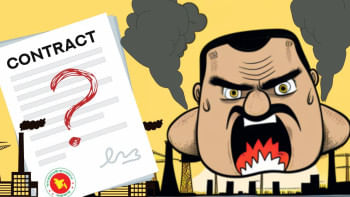Overdependence on gas imports is putting our energy future at risk

Bangladesh is about to enter a period of massive demand for power as it approaches the summer. Between February and June, according to an estimate by the Power Development Board (PDB), the demand is set to increase by more than 50 percent because of summer heat, Boro irrigation and the holy month of Ramadan, when uninterrupted electricity supply is expected. And at least USD 4.45 billion will be needed to cover fuel costs for this period. The amount, we're told, could exceed USD 5 billion if the import bill from the Adani plant and the payment to Chevron, which operates the biggest gas field in the country, are factored in. Naturally, the authorities will be hopeful of securing necessary funds and ensuring adequate power supplies, but it is already apparent that it will not be smooth sailing.
Recent developments call for caution. As per a report by Prothom Alo, the Rampal power plant had to be kept shut for a month due to non-import of coal because of dollar shortage; the Payra power plant is struggling with unpaid coal bills; owners of oil-based power plants in the private sector are struggling to import oil due to outstanding bills of five months; Bangladesh Petroleum Corporation (BPC) is failing to open letters of credit (LC) regularly; Petrobangla is failing to increase LNG import; all the relevant organisations are asking for dollar provisions from the ministry, etc.
What all this means for the general public is that even after all the hikes in prices of gas and electricity, power outage will increase rather than decrease going forward. Whether or not it will match or surpass the acute level of loadshedding witnessed between August and November last year – due to the crisis of foreign currency reserves – remains to be seen. As of February 8, the reserves stood at USD 32.6 billion. The continued dollar crisis makes it essential that the authorities revise PDB cost estimations and reduce import bills. Apart from making funds available, another challenge is the increasing cost of production by power plants. There is no denying that the cost has increased due to our poor energy policy – which relies heavily on fuel imports and allows for collusive deals – as well as unplanned development in the country. It will increase further in the future. The trouble is, any fiscal burden on the government eventually falls on the citizens.
We, therefore, would like to urge our policymakers to revisit the current energy policy. While challenges like dollar crisis and high import bills require urgent attention, we will continue to be vulnerable to such external factors if we cannot fashion today's responses with an eye on tomorrow. Which is why we must reduce our dependence on gas imports. At the same time, we should focus on increasing gas supply from local sources, as well as boosting the drive for green and renewable energy. This will ensure our energy security in the long run. The government must plan for the future, and heed calls for exploring our gas reserves.


 For all latest news, follow The Daily Star's Google News channel.
For all latest news, follow The Daily Star's Google News channel. 









Comments